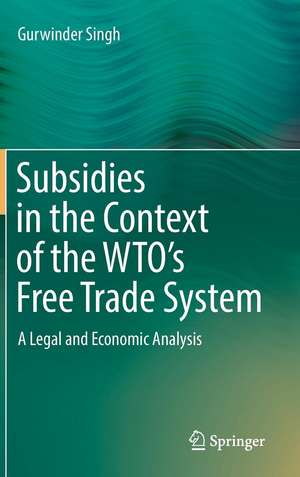Subsidies in the Context of the WTO's Free Trade System: A Legal and Economic Analysis
Autor Gurwinder Singhen Limba Engleză Hardback – 12 sep 2017
This book analyses subsidies from various perspectives and creates a model that determines whether or not their use is justified. Further, it analyses the various causes of trade distortion, trade-discriminatory practices, and other issues associated with unregulated subsidies. In addition, the book considers how these issues fall within the scope of subsidies described under the SCM Agreement.
The primary discussion from the perspective of WTO objective concerns the trade practice of awarding subsidies, for exports and also for protectionist purposes. Here, the terms justifiable and non-justifiable are used as hypothetical parameters to determine the extent of state support, considering the country classification based on economic and technological criteria, and their objectives for development. These parameters are distinct from Prohibited, Actionable, and Non-Actionable subsidies, as classified under the SCM Agreement.
Subsidies awarded for the purposesof development and for welfare are considered as justifiable, whereas subsidies for the promotion of exports or state measures adopted for protectionist purposes are non-justifiable. Lastly, the book addresses the implications of such subsidies on the core objectives of the WTO and in connection with fair trade values.
The primary discussion from the perspective of WTO objective concerns the trade practice of awarding subsidies, for exports and also for protectionist purposes. Here, the terms justifiable and non-justifiable are used as hypothetical parameters to determine the extent of state support, considering the country classification based on economic and technological criteria, and their objectives for development. These parameters are distinct from Prohibited, Actionable, and Non-Actionable subsidies, as classified under the SCM Agreement.
Subsidies awarded for the purposesof development and for welfare are considered as justifiable, whereas subsidies for the promotion of exports or state measures adopted for protectionist purposes are non-justifiable. Lastly, the book addresses the implications of such subsidies on the core objectives of the WTO and in connection with fair trade values.
| Toate formatele și edițiile | Preț | Express |
|---|---|---|
| Paperback (1) | 730.35 lei 6-8 săpt. | |
| Springer International Publishing – 18 mai 2018 | 730.35 lei 6-8 săpt. | |
| Hardback (1) | 1008.60 lei 6-8 săpt. | |
| Springer International Publishing – 12 sep 2017 | 1008.60 lei 6-8 săpt. |
Preț: 1008.60 lei
Preț vechi: 1230.00 lei
-18% Nou
Puncte Express: 1513
Preț estimativ în valută:
192.100€ • 202.01$ • 160.63£
192.100€ • 202.01$ • 160.63£
Carte tipărită la comandă
Livrare economică 31 martie-14 aprilie
Preluare comenzi: 021 569.72.76
Specificații
ISBN-13: 9783319624211
ISBN-10: 3319624210
Pagini: 351
Ilustrații: XIX, 351 p. 1 illus.
Dimensiuni: 155 x 235 x 27 mm
Greutate: 0.69 kg
Ediția:1st ed. 2017
Editura: Springer International Publishing
Colecția Springer
Locul publicării:Cham, Switzerland
ISBN-10: 3319624210
Pagini: 351
Ilustrații: XIX, 351 p. 1 illus.
Dimensiuni: 155 x 235 x 27 mm
Greutate: 0.69 kg
Ediția:1st ed. 2017
Editura: Springer International Publishing
Colecția Springer
Locul publicării:Cham, Switzerland
Cuprins
Regulating free trade from the WTO perspective.- Subsidies in international trade from the WTO perspective.- Discussing agriculture subsidies from the WTO perspective.- Subsidies for dumping.- Unfolding the intricacies of trade subsidies through the WTO rules of origins.- The impact of trade subsidies on the environment: a problem for the WTO trading system.- Remedies: the procedural measures.- Conclusions and suggestions.
Textul de pe ultima copertă
This book analyses subsidies from various perspectives and creates a model that determines whether or not their use is justified. Further, it analyses the various causes of trade distortion, trade-discriminatory practices, and other issues associated with unregulated subsidies. In addition, the book considers how these issues fall within the scope of subsidies described under the SCM Agreement.
The primary discussion from the perspective of WTO objective concerns the trade practice of awarding subsidies, for exports and also for protectionist purposes. Here, the terms justifiable and non-justifiable are used as hypothetical parameters to determine the extent of state support, considering the country classification based on economic and technological criteria, and their objectives for development. These parameters are distinct from Prohibited, Actionable, and Non-Actionable subsidies, as classified under the SCM Agreement.
Subsidies awarded for the purposes of development and for welfare are considered as justifiable, whereas subsidies for the promotion of exports or state measures adopted for protectionist purposes are non-justifiable. Lastly, the book addresses the implications of such subsidies on the core objectives of the WTO and in connection with fair trade values.
The primary discussion from the perspective of WTO objective concerns the trade practice of awarding subsidies, for exports and also for protectionist purposes. Here, the terms justifiable and non-justifiable are used as hypothetical parameters to determine the extent of state support, considering the country classification based on economic and technological criteria, and their objectives for development. These parameters are distinct from Prohibited, Actionable, and Non-Actionable subsidies, as classified under the SCM Agreement.
Subsidies awarded for the purposes of development and for welfare are considered as justifiable, whereas subsidies for the promotion of exports or state measures adopted for protectionist purposes are non-justifiable. Lastly, the book addresses the implications of such subsidies on the core objectives of the WTO and in connection with fair trade values.
Caracteristici
Covers both legal and economic analysis Helps policymakers to resolve issues such as the effect of (artificial) currency devaluation, and the protectionist effects of tariff measures on exports and imports Discusses differences in the motivation for using subsidies between Developed and Developing countries
